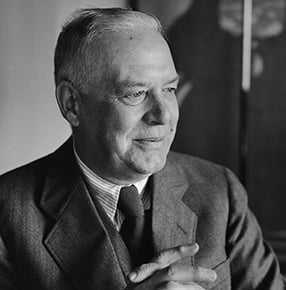The Man Whose Pharynx Was Bad
The time of year has grown indifferent.
Mildew of summer and the deepening snow
Are both alike in the routine I know.
I am too dumbly in my being pent.
The wind attendant on the solstices
Blows on the shutters of the metropoles,
Stirring no poet in his sleep, and tolls
The grand ideas of the villages.
The malady of the quotidian . . .
Perhaps, if summer ever came to rest
And lengthened, deepened, comforted, caressed
Through days like oceans in obsidian
Horizons full of night’s midsummer blaze;
Perhaps, if winter once could penetrate
Through all its purples to the final slate,
Persisting bleakly in an icy haze;
One might in turn become less diffident—
Out of such mildew plucking neater mould
And spouting new orations of the cold.
One might. One might. But time will not relent.
This poem is in the public domain. Published in Poem-a-Day on October 7, 2023, by the Academy of American Poets.
“The Man Whose Pharynx Was Bad” appeared in The New Republic, vol. 28, no. 354 (September 14, 1921), and later again in the 1931 reissue of Harmonium (Alfred A. Knopf). In “Wallace Stevens: Reduction to the First Idea,” published in Diacritics, vol. 6, no. 3 (Autumn, 1976), Harold Bloom writes, “The poet begins as the man who has more than a psychic sore throat; he has writer’s block, acedia: ‘I am too dumbly in my being pent.’ The malady, as I now unsurprisingly suggest, is a badly repressed case of the anxiety of influence [. . .]. Summer and winter here, the weather of the wind as of the sky, belong to the seasons of the soul in High Romanticism. The oceans, as elsewhere in Stevens, are from [Walt] Whitman’s Sea-Drift Kosmos, and the deprecated function of the poet is the Emersonian and American one, to be a new orator, even if spouting of the cold. Nature, in Stevens’s poem, is Coleridgian and Emersonian nature [. . .]. This nature is ethos or Fate, a universe of death whose cyclic repetitions can only be broken through by transgressive acts of origination, an origination that can be performed only as and by the Will, the pathos or potentia of Power.”

